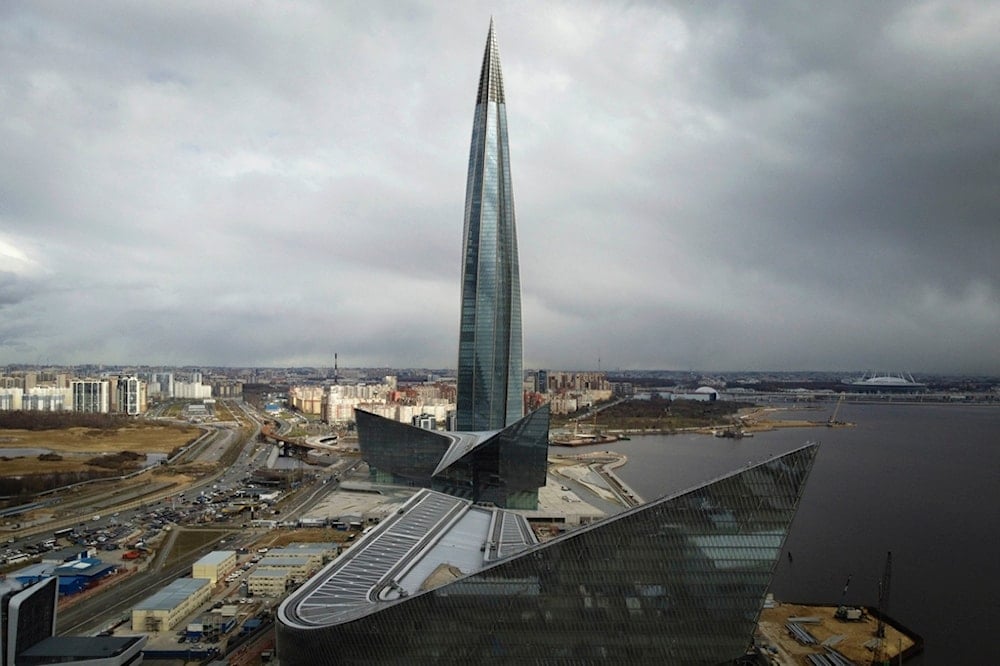US, UK impose new sanctions on Russia's energy sector
Gazprom Neft condemned the move, calling the sanctions "baseless" and "illegitimate," as reported by Russian state media.
-

FILE - A view of the business tower Lakhta Centre, the headquarters of Russian gas monopoly Gazprom in St. Petersburg, Russia, April 27, 2022. (AP Photo/Dmitri Lovetsky, File)
The United States and the United Kingdom announced a new round of sanctions on Friday targeting Russia's energy industry, including major oil companies Gazprom Neft and Surgutneftegas. The measures, introduced just days before US President Joe Biden leaves office, aim to cut off critical revenue streams for Russia.
The US Treasury Department revealed that over 180 ships, along with the two oil giants and their subsidiaries, were added to the sanctions list as part of the G7's strategy to curb Moscow's energy income. Meanwhile, the UK joined in by sanctioning the same companies for their alleged role in financing Russia's military efforts.
"Taking on Russian oil companies will drain Russia's war chest – and every ruble we take from Putin's hands helps save Ukrainian lives," UK Foreign Secretary David Lammy said in a statement.
In response, Gazprom Neft condemned the move, calling the sanctions "baseless" and "illegitimate," as reported by Russian state media. A representative for the company stated that the decision contradicts the principles of free competition.
The announcement caused oil prices to rise, with Brent crude trading 3.5% higher at $79.58 per barrel.
Read more: World still clinging to Russian energy despite sanctions: Time
The US also extended sanctions to nearly 400 individuals and entities, including oil traders, service providers, and hundreds of vessels involved in transporting Russian oil. Daleep Singh, Biden's deputy national security advisor for international economics, described the sanctions as the most impactful yet against Russia's energy sector, stating, "Today, the United States imposed the most significant sanctions yet on Russia's energy sector, by far the largest source of revenue for Putin's war."
Ukrainian President Volodymyr Zelensky praised the efforts, noting, "These measures deliver a significant blow to the financial foundation of Russia's war machine by disrupting its entire supply chain."
Reaction from Moscow and Allies
Kremlin spokesman Dmitry Peskov accused the outgoing Biden administration of attempting to complicate matters for the incoming US President Donald Trump. Serbian President Aleksandar Vucic also voiced concerns, highlighting the sanctions' impact on the Petroleum Industry of Serbia (NIS), which is majority-owned by Gazprom Neft. NIS is a crucial supplier of gas for Serbia, as well as a key operator of the gas pipelines serving Serbian households and industries.
Vucic announced plans to discuss the situation with Putin and assess the sanctions' potential ramifications for regional energy security.
Read more: Slovakia demands compensation if Russian gas transits not restored
According to Reuters, senior US officials claim that the sanctions aim to strengthen leverage in negotiations between Ukraine and Russia. By targeting Russia's primary source of income, the measures are intended to disrupt its capacity to sustain its military operations, while simultaneously advancing diplomatic efforts for a resolution to the conflict.
The Financial Times, however, suggests that there are concerns among EU officials about the durability of these sanctions, as Trump might reverse them upon taking office.
Sanctions Backfire
Since the NATO-led war in Ukraine began in February 2022, the EU has imposed 15 sanction packages on Russia. However, instead of weakening Russia, Western sanctions have led to rising electricity, fuel, and food prices in Europe and the US.
That said, the Russian government asserts that the West lacks the courage to acknowledge the failure of its sanctions policy. President Vladimir Putin argues that the West's long-term strategy is to contain and weaken Russia, regardless of the harm it causes to the global economy.

 4 Min Read
4 Min Read









